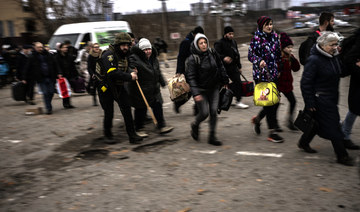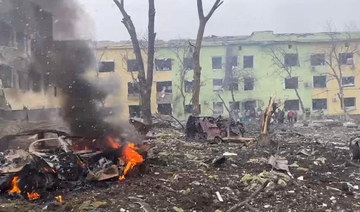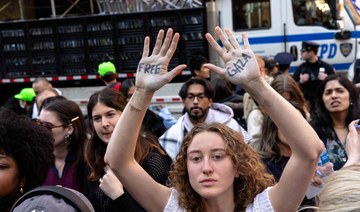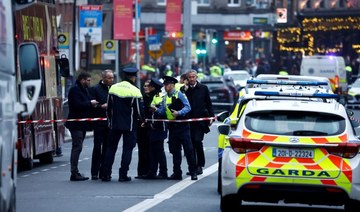WASHINGTON: Russia’s invasion of Ukraine has given the smaller nation’s embassy in Washington an unexpected role: recruitment center for Americans who want to join the fight.
Diplomats working out of the embassy, in a townhouse in the Georgetown section of the city, are fielding thousands of offers from volunteers seeking to fight for Ukraine, even as they work on the far more pressing matter of securing weapons to defend against an increasingly brutal Russian onslaught.
“They really feel that this war is unfair, unprovoked,” said Ukraine’s military attaché, Maj. Gen. Borys Kremenetskyi. “They feel that they have to go and help.”
US volunteers represent just a small subset of foreigners seeking to fight for Ukraine, who in turn comprise just a tiny fraction of the international assistance that has flowed into the country. Still, it is a a reflection of the passion, supercharged in an era of social media, that the attack and the mounting civilian casualties have stirred.
“This is not mercenaries who are coming to earn money,” Kremenetskyi said. “This is people of goodwill who are coming to assist Ukraine to fight for freedom.”
The US government discourages Americans from going to fight in Ukraine, which raises legal and national security issues.
Since the Feb. 24 invasion, the embassy in Washington has heard from at least 6,000 people inquiring about volunteering for service, the “vast majority” of them American citizens, said Kremenetskyi, who oversees the screening of potential US recruits.
Half the potential volunteers were quickly rejected and didn’t even make it to the Zoom interview, the general said. They lacked the required military experience, had a criminal background or weren’t suitable for other reasons such as age, including a 16-year-old boy and a 73-year-old man.
Some who expressed interest were rejected because the embassy said it couldn’t do adequate vetting. The general didn’t disclose the methods used to screen people.
Kremenetskyi, who spoke to The Associated Press just after returning from the Pentagon for discussions on the military hardware his country needs for its defense, said he appreciates the support from both the US government and the public.
“Russians can be stopped only with hard fists and weapons,” he said.
So far, about 100 US citizens have made the cut. They include veterans of the wars in Iraq and Afghanistan with combat experience, including some helicopter pilots, the attaché said.
They must make their own way to Poland, where they are to cross at a specified point, with their own protective gear but without a weapon, which they will get after they arrive. They will be required to sign a contract to serve, without pay, in the International Legion for the Territorial Defense of Ukraine.
The Ukrainian government says about 20,000 foreigners from various nations have already joined.
Borys Wrzesnewskyj, a former Liberal lawmaker in Canada who is helping to facilitate recruitment there, said about 1,000 Canadians have applied to fight for Ukraine, the vast majority of whom don’t have any ties to the country.
“The volunteers, a very large proportion are ex-military, these are people that made that tough decision that they would enter the military to stand up for the values that we subscribe to,” Wrzesnewskyj said. “And when they see what is happening in Ukraine they can’t stand aside.”
It’s not clear how many US citizens seeking to fight have actually reached Ukraine, a journey the State Department has urged people not to make.
“We’ve been very clear for some time, of course, in calling on Americans who may have been resident in Ukraine to leave, and making clear to Americans who may be thinking of traveling there not to go,” Secretary of State Antony Blinken told reporters recently.
US citizens aren’t required to register overseas. The State Department says it’s not certain how many have entered Ukraine since the Russian invasion.
Under some circumstances, Americans could face criminal penalties, or even risk losing their citizenship, by taking part in an overseas conflict, according to a senior federal law enforcement official.
But the legal issues are only one of many concerns for US authorities, who worry about what could happen if an American is killed or captured or is recruited while over there to work for a foreign intelligence service upon their return home, said the official, who spoke on condition of anonymity to discuss sensitive security matters.
The official and independent security experts say some of the potential foreign fighters may be white supremacists, who are believed to be fighting on both sides of the conflict. They could become more radicalized and gain military training in Ukraine, thereby posing an increased danger when they return home.
“These are men who want adventure, a sense of significance and are harking back to World War II rhetoric,” said Anne Speckhard, who has extensively studied foreigners who fought in Syria and elsewhere as director of the International Center for the Study of Violent Extremism.
Ukraine may be getting around some of the potential legal issues by only facilitating the overseas recruitment, and directing volunteers to sign their contracts, and receive a weapon, once they arrive in the country. Also, by assigning them to the territorial defense forces, and not front-line units, it reduces the chance of direct combat with Russians, though it’s by no means eliminated.
The general acknowledges the possibility that any foreigners who are captured could be used for propaganda purposes. But he didn’t dwell on the issue, focusing instead on the need for his country to defend itself against Russia.
“We are fighting for our existence,” he said. “We are fighting for our families, for our land. And we are not going to give up.”
US citizens seek to join foreign fighters in Ukraine
https://arab.news/8px7k
US citizens seek to join foreign fighters in Ukraine
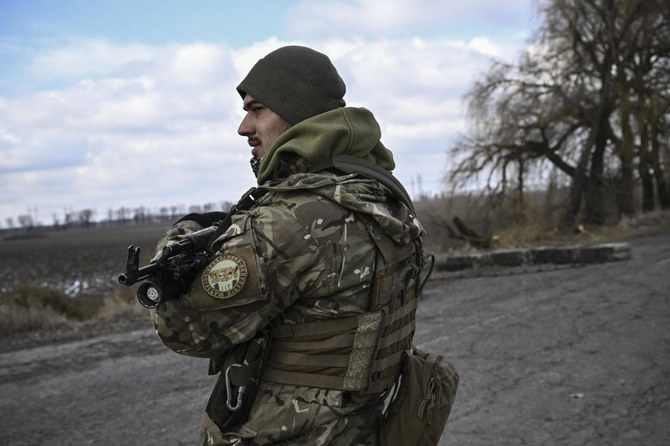
- The US government discourages Americans from going to fight in Ukraine
- Half the potential volunteers were quickly rejected and didn’t even make it to the Zoom interview
Anti-war protest ruffles University of Michigan as demonstrations collide with graduation season

- Israel has killed more than 34,000 Palestinians, according to Gaza’s Health Ministry
- Tent encampments of protesters calling on universities to stop doing business with Israel or companies they say support the war in Gaza have spread across campuses nationwide in recent weeks in a student movement unlike any other this century
NEW YORK: Protesters chanted anti-war messages and waved Palestinian flags during the University of Michigan’s commencement Saturday, as student demonstrations against the Israel-Hamas war collided with the annual pomp-and-circumstance of graduation season at American universities.
The protest happened at the beginning of the event at Michigan Stadium in Ann Arbor. About 75 people, many wearing traditional Arabic keffiyeh along with their graduation caps, marched up the main aisle toward the graduation stage.
They chanted “Regents, regents, you can’t hide! You are funding genocide!” while holding signs, including one that read: “No universities left in Gaza.”
Overhead, planes flew competing messages. One read: “Divest from Israel now! Free Palestine!” The other read: “We stand with Israel. Jewish lives matter.”
Officials said no one was arrested, and the protest didn’t seriously interrupt the nearly two-hour event, which was attended by tens of thousands of people, some of them waving Israeli flags.
State police prevented the demonstrators from reaching the stage and university spokesperson Colleen Mastony said public safety personnel escorted the protesters to the rear of the stadium, where they remained through the conclusion of the event.
“Peaceful protests like this have taken place at U-M commencement ceremonies for decades,” she added.
US Navy Secretary Carlos Del Toro paused a few times during his remarks, saying at one point, “Ladies and gentlemen, if you can please draw your attention back to the podium.”
Before he administered an oath to graduates in the armed forces, Del Toro said they would “protect the freedoms that we so cherish,” including the “right to protest peacefully.”
The university has allowed protesters to set up an encampment on campus but police assisted in breaking up a large gathering at a graduation-related event Friday night, and one person was arrested.
Michigan was among the schools bracing for protests during its commencement ceremonies this weekend, including Indiana University, Ohio State University and Northeastern University in Boston. Many more are slated in the coming weeks.
At Indiana University, protesters were urging supporters to wear their keffiyehs and walk out during remarks by President Pamela Whitten on Saturday evening. The campus in Bloomington, Indiana, has designated a protest zone outside Memorial Stadium, where the ceremony is set to take place.
Tent encampments of protesters calling on universities to stop doing business with Israel or companies they say support the war in Gaza have spread across campuses nationwide in recent weeks in a student movement unlike any other this century. Some schools have reached agreements with the protesters to end the demonstrations and reduce the possibility of disrupting final exams and commencements.
Many encampments have been dismantled and protesters arrested in police crackdowns.
The Associated Press has recorded at least 61 incidents since April 18 where arrests were made at campus protests across the US More than 2,400 people have been arrested on 47 college and university campuses. The figures are based on AP reporting and statements from universities and law enforcement agencies.
At Princeton, in New Jersey, 18 students launched a hunger strike in an effort to push the university to divest from companies tied to Israel.
Senior David Chmielewski, a hunger striker, said in an email Saturday that the latest protest started Friday morning with participants consuming water only.
He said the hunger strike will continue until university administrators meet with students about their demands, which include amnesty from criminal and disciplinary charges for protesters.
Other demonstrators are participating in “solidarity fasts” lasting 24 hours, he said.
Princeton students set up a protest encampment and some held a sit-in at an administrative building this week, leading to about 15 arrests.
Students at other colleges, including Brown and Yale, launched similar hunger strikes earlier this year before the more recent wave of protest encampments.
In other developments Saturday, police broke up a demonstration at the University of Virginia. Campus police called it an “unlawful assembly” in a post on the social platform X.
Footage from WVAW-TV showed police wearing tactical gear removing protesters from an encampment on the Charlottesville campus. Authorities have not said how many people were arrested.
Meanwhile near Boston, students at Tufts University peacefully took down their protest encampment without police intervention Friday night.
Officials with the school in Medford, Massachusetts, said they were pleased with the development, which wasn’t the result of any agreement with protesters. Protest organizers said in a statement that they were “deeply angered and disappointed” that negotiations with the university had failed.
The protests stem from the Israel-Hamas conflict that started on Oct. 7 when Hamas militants attacked southern Israel, killing about 1,200 people, mostly civilians, and taking roughly 250 hostages.
Vowing to destroy Hamas, Israel launched an offensive in Gaza that has killed more than 34,500 Palestinians, around two-thirds of them women and children, according to the Health Ministry in the Hamas-ruled territory. Israeli strikes have devastated the enclave and displaced most of Gaza’s inhabitants.
US blames Rwanda for deadly attack on displaced camp in DR Congo

- DR Congo government spokesman Patrick Muyaya on Friday had also accused “the Rwandan army and its M23 terrorist supporters” of being responsible in a statement on X, the former Twitter
WASHINGTON: The United States has accused Rwanda of involvement in a deadly attack on a camp for displaced people in the eastern Democratic Republic of Congo, a claim dismissed as “absurd” by Kigali on Saturday.
At least nine people were killed in blasts on Friday in the camp on the outskirts of the city of Goma, local sources said.
“The United States strongly condemns the attack (Friday) from Rwanda Defense Forces and M23 positions on the Mugunga camp for internally displaced persons in eastern Democratic Republic of the Congo,” State Department spokesman Matthew Miller said in a statement.
Miller said the United States was “gravely concerned” by the expansion in DR Congo of Rwandan forces and the M23, a mostly Tutsi group that resumed its armed campaign in the vast, long turbulent DR Congo in 2021.
“It is essential that all states respect each other’s sovereignty and territorial integrity and hold accountable all actors for human rights abuses in the conflict in eastern DRC,” he said.
DR Congo government spokesman Patrick Muyaya on Friday had also accused “the Rwandan army and its M23 terrorist supporters” of being responsible in a statement on X, the former Twitter.
Rwandan government spokesperson Yolande Makolo described the US comments as “ridiculous,” in a post on X.
“How do you come to this absurd conclusion? The RDF, a professional army, would never attack an IDP camp,” she said.
“Look to the lawless FDLR and Wazalendo supported by the FARDC (the Congolese armed forces), for this kind of atrocity,” she added.
The FDLR, or Democratic Forces for the Liberation of Rwanda, is an armed ethnic Hutu group operating in Congo’s east for 30 years, while Wazalendo is fighting the M23 alongside the Congolese army.
The origin of Friday’s blasts has not been clearly established.
According to witnesses, government forces positioned near the camp had been bombarding the rebels on hills further west since early morning and, according to a civil society activist, “the M23 retaliated by throwing bombs indiscriminately.”
“Horror in its most serious form! A bomb on civilians, deaths, children! A new war crime,” said the government spokesman Muyaya.
The United States has repeatedly backed Kinshasa’s claims that Rwanda has backed the M23, but Miller’s statement amounts to an unusually direct implication.
France’s President Emmanuel Macron also this week called on Rwanda to end its backing for M23 rebels and withdraw its troops from DR Congo territory.
President Paul Kagame in turn has demanded that the DR Congo act against Hutu forces over ties with the perpetrators of Rwanda’s 1994 genocide, which mostly targeted Tutsis.
The United States has repeatedly sought to mediate between the two sides, with intelligence chief Avril Haines in November visiting DR Congo and Rwanda and announcing a pathway to reduce tensions.
Secretary of State Antony Blinken this year met Kagame and voiced hope that Rwanda was willing to engage in diplomacy.
Netherlands remembers World War Two dead amid tight security due to Gaza war
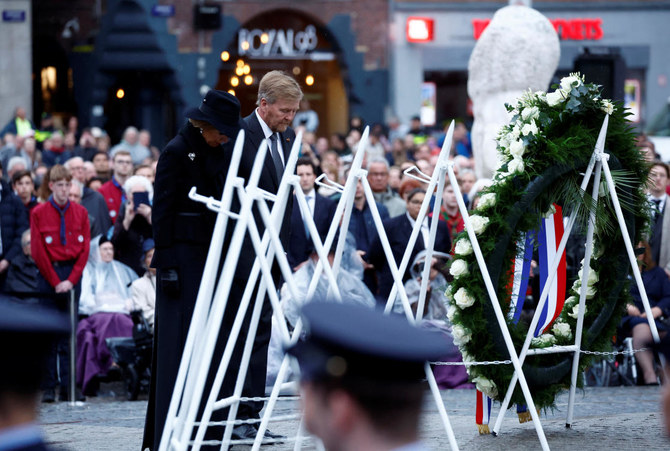
- Normally some 20,000 people attend the Dam commemoration
- Earlier this week municipal authorities announced unprecedented security measures to keep the ceremony safe and avoid possible disruptions linked to the Israel-Hamas war
AMSTERDAM: Dutch King Willem-Alexander and Prime Minister Mark Rutte joined around 4,000 people on Saturday for the country’s annual World War Two remembrance ceremony amid restricted public access and heightened security due to the war in Gaza.
The ceremony on Amsterdam’s central Dam square, with the traditional two minutes of silence at 8 p.m. (1800 GMT) to commemorate the victims of World War Two, passed smoothly despite fears that there might be protests.
Normally some 20,000 people attend the Dam commemoration without having to register. But earlier this week municipal authorities announced unprecedented security measures to keep the ceremony safe and avoid possible disruptions linked to the Israel-Hamas war.
At the opening of a Holocaust Museum in Amsterdam in March, pro-Palestinian protesters opposed to Israel’s military campaign in Gaza set off fireworks and booed Israeli President Isaac Herzog as he arrived on a visit.
Every town and the city in the Netherlands holds its own remembrance ceremony on May 4 and tens of thousands of people attend the events. The Netherlands then marks on May 5 the anniversary of its liberation from Nazi occupation in 1945.
Drone footage shows Ukrainian village battered to ruins as residents flee Russian advance
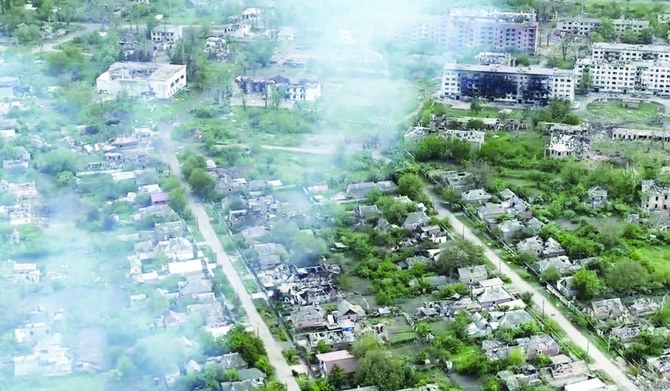
- Residents have scrambled to flee the village, among them a 98-year-old woman who walked almost 10 kilometers (6 miles) alone last week, wearing a pair of slippers and supported by a cane, until she reached Ukrainian front lines
KYIV: The Ukrainian village of Ocheretyne has been battered by fighting, drone footage obtained by The Associated Press shows. The village has been a target for Russian forces in the Donetsk region of eastern Ukraine.
Russian troops have been advancing in the area, pounding Kyiv’s depleted, ammunition-deprived forces with artillery, drones and bombs. Ukraine’s military has acknowledged the Russians have gained a “foothold” in Ocheretyne, which had a population of about 3,000 before the war, but says that fighting continues.
Residents have scrambled to flee the village, among them a 98-year-old woman who walked almost 10 kilometers (6 miles) alone last week, wearing a pair of slippers and supported by a cane, until she reached Ukrainian front lines.
FASTFACT
Ukraine’s military has acknowledged the Russians have gained a “foothold” in Ocheretyne, which had a population of about 3,000 before the war, but says that fighting continues.
Not a single person is seen in the footage, and no building in Ocheretyne appears to have been left untouched by the fighting. Most houses, apartment blocks and other buildings look damaged beyond repair, and many houses have been pummeled into piles of wood and bricks. A factory on the outskirts has also been badly damaged.
The footage also shows smoke billowing from several houses, and fires burning in at least two buildings.
Elsewhere, Russia has in recent weeks stepped up attacks on Kharkiv, Ukraine’s second-largest city, in an attempt to pummel the region’s energy infrastructure and terrorize its 1.3 million residents.
Four people were wounded and a two-story civilian building was damaged and set ablaze overnight after Russian forces struck Kharkiv, in northeastern Ukraine, with exploding drones, regional governor Oleh Syniehubov said Saturday.
The four, including a 13-year-old, were hurt by falling debris, he said on the Telegram messaging app.
Russian state agency RIA reported Saturday reported that Moscow’s forces struck a drone warehouse in Kharkiv that had been used by Ukrainian troops overnight, citing Sergei Lebedev, described as a coordinator of local pro-Moscow guerrillas. His comments could not be independently verified.
Syniehubov said Russia also bombed Kharkiv on Friday, damaging residential buildings and sparking a fire. An 82-year-old woman died and two men were wounded.
Ukraine’s military said Russia launched a total of 13 Shahed drones at the Kharkiv and Dnipropetrovsk regions of eastern Ukraine overnight, all of which were shot down by Ukrainian air defenses.
Students in Ireland, Switzerland join the protest wave over Gaza
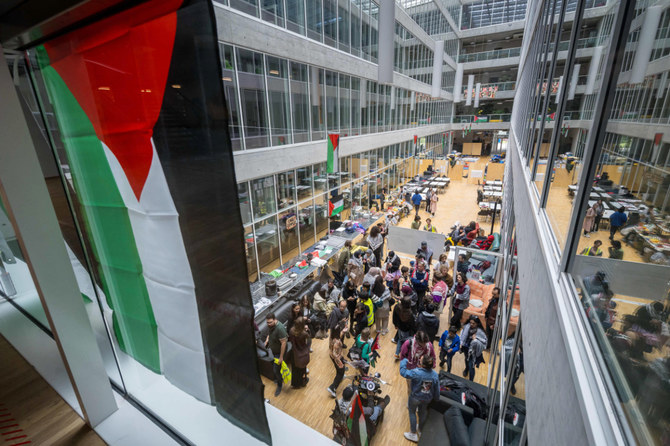
- Dublin students build encampment, forcing university to restrict campus access and close Book of Kells exhibition
- Israel has killed more than 34,000 Palestinians in Gaza, mostly women and children, according to the health ministry in the Hamas-run territory
DUBLIN: Students at Trinity College Dublin and Lausanne University in Switzerland have staged occupations to protest against Israel’s war in Gaza, joining a wave of demonstrations sweeping US campuses.
In Dublin, students built an encampment on Friday, forcing the university to restrict campus access on Saturday and close the Book of Kells exhibition, one of Ireland’s top tourist attractions.
The camp was set up after the students’ union said the university had fined it €214,000 ($230,000) for losses caused by protests in recent months, not exclusively over Gaza.
The protesters were demanding that Trinity cut academic ties with Israel and divest from companies with ties to Israel.
BACKGROUND
The protesters were demanding that Trinity College Dublin cut academic ties with Israel and divest from companies with ties to Israel.
Students’ union president Laszlo Molnarfia posted a photograph of benches piled up at the entrance to the building housing the Book of Kells, an illuminated manuscript created by Celtic monks in about 800 AD.
Trinity College said it had restricted access to students, staff, and residents to ensure safety and that the exhibition would be closed on Saturday.
More than 34,600 Palestinians have been killed in Israel’s seven-month-old assault on the Gaza Strip, say health officials in the enclave.
The war began when Hamas militants attacked Israel on Oct. 7.
Pro-Palestinian protests have also been held at universities in Australia and Canada.
In Lausanne, around 100 students occupied a building to back demands, including an end to scientific cooperation with Israel.
“Palestinians have been dying for over 200 days, but we are not being heard,” one protester told Swiss television on Saturday.
“There’s a global movement to get governments to take action, but it’s not happening. That’s why we want to get universities involved now.”
The university said the occupation could continue until Monday, provided it did not disrupt work on campus.
“We universities are not called upon to take political stands,” the university’s rector, Frederic Herman, told RTS radio.
Last week, the head of Trinity College, Linda Doyle, said it was reviewing its investments but that it was for individual academics to decide whether to work with Israeli institutions.



